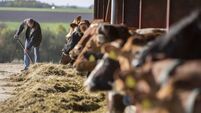Policymakers warned that 3.8% drop in cattle numbers could double

In the last 12 months, there has been a drop of over 276,000 head of cattle. Stock picture
The 3.8% drop in the national cattle herd in the last 12 months should be of concern to policymakers, says the Irish Cattle and Sheep Farmers’ Association (ICSA).
ICSA beef chairman John Cleary said the drop of more than 276,000 head of cattle is a warning to policymakers and could double next year if current trends continue.
“These numbers are not a surprise to farmers on the ground, but they should be a wake-up call for policymakers," he said.
"According to Department of Agriculture figures, we’ve lost over 276,000 cattle in the space of a year. The national herd is declining at a worrying pace, and unless there is urgent intervention, the exodus from cattle farming will only accelerate,” he said.
Mr Cleary said: “What we are now witnessing is the cumulative impact of policies that just keep making it increasingly difficult to keep cattle.
"Beef-sired cattle numbers are down over 92,000 head in just 12 months, and if this trend continues, we could see a decline of double that magnitude next year.
Mr Cleary warned that farmers are experiencing more restrictions, and with looming threats of CAP being dismantled and nitrates regulation tightening, herd numbers are dropping as a result.
“There is also the very real prospect that with fewer cattle in the system and reduced factory throughput, we’ll see less competition, with smaller processors being squeezed out," he said. "That will inevitably hit farmers in the pocket through weaker prices. We cannot afford to let that happen.”
Mr Cleary said that while live exports have increased and continue to play a vital role in balancing the market, they may not be a long-term solution.
He cautioned policymakers, saying current farmers are struggling to keep up with paperwork and policy swings, and young people looking to enter the industry are second-guessing their decision, watching the decline of the industry and stressors being placed on existing farmers.
Concluding, Mr Cleary said, “If policymakers don’t act now to restore confidence and give farmers a reason to stay in business, the collapse of the national herd will become unstoppable - and with it, the collapse of rural economies across the country.”


